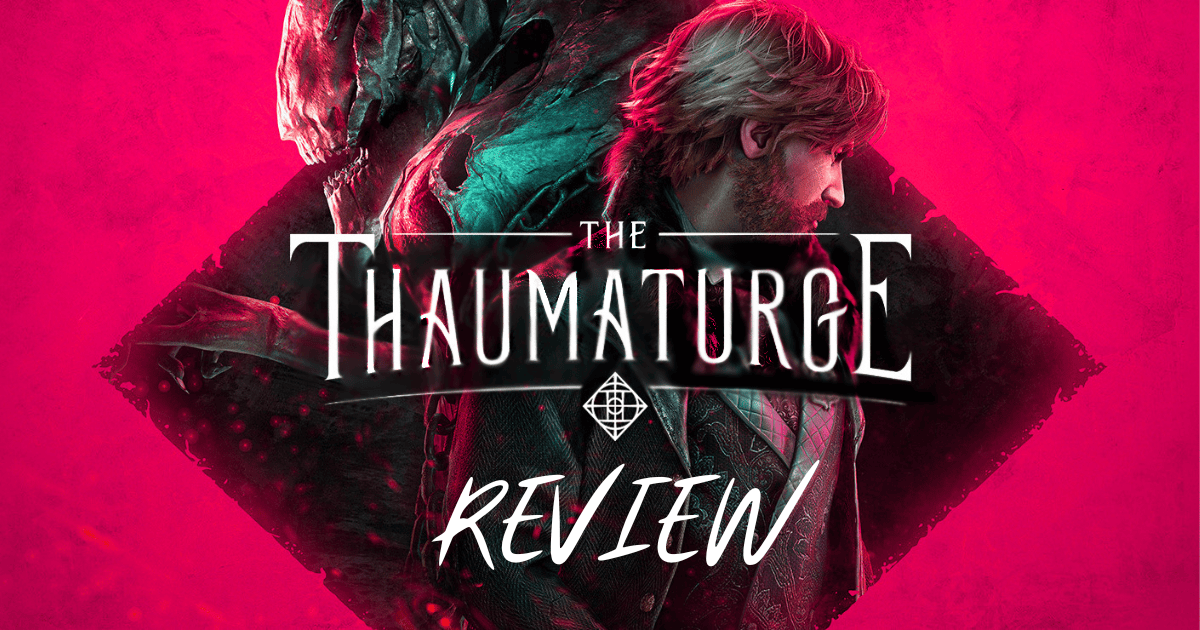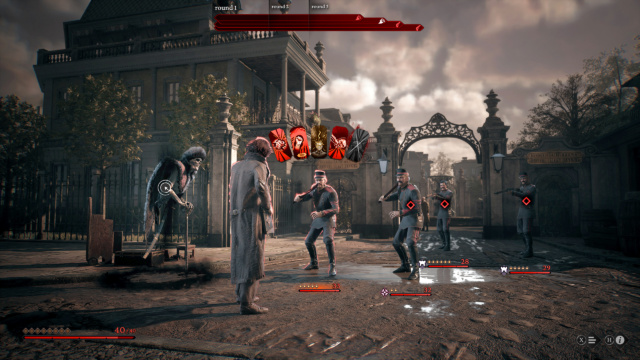‘The Thaumaturge’ Game Review: Thrills and Spells Captivate Early Century Poland

The Thaumaturge is an isometric, narrative RPG game developed by Fool’s Theory Studio and published by 11 bits Studio. It tells a story of a Polish Thaumaturge and aristocrat Wiktor Szulski who decided that after long years of being away from home, it’s time to return. It’s time he finally finds out his family’s actual past. As a proud Polish person, I was thrilled to play a title in a setting I know intimately.
[Note: While I am reviewing this game independently and honestly, it should be noted that it has been provided to me by Fool’s Theory, 11 Bit Studios, and Evolve PR for the purpose of this review. Warning: Light spoilers from The Thaumaturge are below!]
What is a Thaumaturge?
First things first, it would help if I explain what is a “Thaumaturge.” They are individuals who ordinary people consider wizards, crazy people, and sometimes even servants of the devil. But only some of those descriptions are true. Their powers are primarily sourced through genetics, allowing them to see things no one else can see. They can feel people’s thoughts, past activities and manipulate their thoughts.
This is all thanks to books they call “Grimoires,” printed volumes of spells and enchantments. Thanks to those genetics, Thaumaturges can connect and apprehend demons called “Salutors”, who can assist them. Faithfully obeying their masters, Salutors allow Thaumaturges to manipulate humans, preying on their secrets and insecurities.
The whole game is full of Easter eggs, which refer to Poland’s past, Slavic mythology, and historical events, even introducing real-life characters who were a part of it. But even in our real-life history, some people were seen as Thaumaturges. In the past, it was seen more as working wonders rather than magic or Satanism.

The term “Thaumaturgy” originated in Greece, where “thauma” meant miracle or marvel and “turge” meant work. In different beliefs, Thaumaturgy has conflicting views. In Hinduism, they were seen as people who claimed to possess paranormal powers, such as the ability to heal, see or influence future events, and read minds.
In Christianity, on the other hand, they were seen as saints through whom God causes a miracle to work. Among famous Thaumaturges were Gregory Thaumaturgus, Saint Menas of Egypt, Saint Nicholas or John of Kronstadt. Buddhist and Islamic beliefs thought of them as supernatural beings who have superpowers.
Playing through 1900’s Poland in The Thaumaturge
In this game, we follow the story of a Polish Thaumaturge, Wiktor Szulski. Set in 1905 in Warsaw, the game reveals the whole story behind weird events going around the city. Because of the partitions of Poland in 1772, 1793, and 1795, Poland vanished from the maps of the world. Due to those events, until 1918, Warsaw was under the occupation of the Russian Empire, which further makes this more important to the background of the game’s story.
The city’s inhabitants have diverse backgrounds, beliefs, and often conflicting interests. Among them are Russian soldiers, Jewish merchants, Polish bourgeoisie, and more. But from the first moment Wiktor arrives in Warsaw, he can see that people are sick of this oppression and are trying to liberate themselves. His part in whether he decides to help in freeing Warsaw from Russian occupation will prove meaningful in future events.
Wiktor came back to Warsaw because his father (also a Thaumaturge) passed away in unexplained circumstances. He didn’t like his father because according to Wiktor, his father Stanisław was never proud of him, never cared about him and all he wanted from him was to be the best in everything, no matter what. Wiktor also has a sister, Ligia, a proud woman and a representative of feminism in Poland. That already shows how strong and capable of a woman she is, and that she’ll never bend under pressure.
The storyline delves into the complexities of this unfaithful era, offering multiple perspectives. We can see poor people, ex-soldiers, and patriots, each with their angle on events happening at that time. Some don’t care about the oppression. They want to mind their own business, while others want to do everything to kick the asses of Russians.
Moreover, the game intertwines heavily with esoteric themes, featuring other Thaumaturges and people specializing in mythical and magic topics who provide another point of view on the whole “talking to dead/monsters/ghosts” situation.
One of those is the famous Grigori Rasputin, whom we meet at the start of the game, and we find out that (at least in the reality of this game) his alleged powers exist. He helped Wiktor to regain his connection to his first Salutor Upyr. From the beginning, he is curious about Wiktor’s background and is fascinated by how Wiktor proved him wrong of doubting in Thaumaturges.
The whole plot of The Thaumaturge (without full spoilers of course) revolves around finding different Salutors, fighting Russian soldiers, finding out how your father died. I also learned about Wiktor’s father’s grimoire and understood the true power of what it means to be a Thaumaturge. I spent dozens of hours researching and exploring Warsaw because, with each found note, hidden trace of something or something else, you get experience points. You need them if you want to be the best Thaumaturge there is.
The turn-based combat system in Thaumaturge is challenging
The combat in The Thaumaturge is turn-based, and we use some cards in battle that we can equip. They’re either fast attack (weaker) attack, slower (more powerful) attack, status change attacks and an overpowered attack. Additionally, after each turn, we can choose what our Salutors can do.
Salutor’s powers vary from siphoning life from enemies over to us or weakening them with great power and dealing tremendous damage. Honestly, when I started playing, I couldn’t get a grip of how to play, instead I was just attacking with the highest damage attacks repeatedly. But, when I lost to Lelek 9 times in a row and spent 1 hour trying to defeat him, I figured out it’s not an easy job.

Each turn, you have to look at what your opponent will do next, and what you can do to defeat them. Sometimes it can take so much time, but the result is very satisfying. Bosses are different when it comes to the story. Because of your ability of persuasion, you can change different dialogues and influence other outcomes, ergo some fights may not happen. It’s very useful if you know a harder boss is coming soon, and you don’t have good builds/upgrades to fight them. So then, if there is an option, you can avoid it.
Gameplay is very intuitive, thanks to the 2.5D graphics that allows you to explore the different areas of Warsaw without pushing your processor and graphics card to render the beautifully detailed world around you. All you have to do is to use an ability to reveal things by snapping your fingers, and there you have it. You can see where to go, you can see hidden things, and after you find enough of clues, you can finish side quests.
Final verdict on Wiktor Szulski’s (and Poland’s) story
The Thaumaturge impressed me with its boldness in telling the story of occupied Poland and doing it in a way everyone (even people vastly unfamiliar with Polish history) would understand. What’s also deserving of praise is Wiktor Szulski and his story.
In the beginning, you can feel that he’s lost and doesn’t know what to do with himself. But as we progress his story, and he evolves, he becomes more experienced and confident. His family and companions are well-written, and their relationship with each other resonates with what you can expect in early 1900s Poland.
The game is extraordinary in every way and a real award contender among 2.5D games. It’s a fantastic experience of humor, love, sadness, darkness, understanding, and hope. The Thaumaturge proves that you don’t have to be a 3D game with a big budget to give fans an outstanding experience they’ll fondly remember for a very long time. I can’t wait to replay it soon and see what different decisions could bring, and what could happen if I picked different builds for fights.
My rating: 4.5/5
The Thaumatarge is now available on PC and coming to consoles later this year. Are you interested in playing it? Let us know on social media @mycosmiccircus or on The Cosmic Circus Discord server.
Assassin’s Creed Theory: How Utilizing the Past Can Influence the Future
Alan Wake II Review: Another Amazing Game Of The Year Contender




